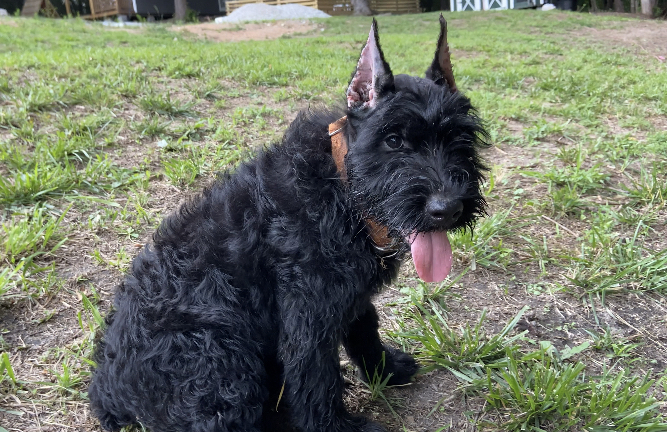As a pet owner, it is your responsibility to keep your giant schnauzer healthy and safe. How do you prevent them from being ill? Here are some suggestions that you can keep in mind to prevent your dog from catching any disease rather than cure them.
Veterinary visits.
Did you know that dogs age faster than we do? As a matter of fact, one calender year for a dog is equivalent to 4-15 human years. This is due to the faster maturation of dogs and this depends on their breed. During the first year of life, pups grow and mature very fast and they are considered teenagers after only 12 months!
After their second birthday, their age is equivalent to 25 years old. When this happens, aging rate slows down and your dog’s age is between 4 to 5 years for every calendar year. Large breed dogs age faster than smaller breeds. Since giant schnauzers are considered large breeds, their life expectancy may be around 8 years.
That being said, your furry friend should visit their doctor more frequently. Preventive health care is very essential because they have a more rapid aging process than we do. Regular visits would also give you a chance to track your giant schnauzer’s growth and development and discuss with the vet if you have any concerns about your pet.
Screening and blood testing
According to the recommendation of the American Animal Hospital Association (AAHA) and American Veterinary Medical Association (AVMA), getting your giant schnauzer tested for intestinal parasites should be done once to twice a year. Blood tests such as complete blood count, chemistry panel, thyroid screen to name a few, and urinalysis should be performed annually. Screening for vector borne diseases such as Lyme disease is advised especially if you live in areas where ticks are common.
Oral care.
It is true that dogs live longer if they have clean mouths. That is why, oral health has a great impact on your giant schnauzer’s overall health. Ideally, you can have your pet’s teeth cleaned every 1 to 2 years, but this may still vary depending on a number of factors such as age, breed, diet and including preventive care.
Immunizations.
As long as there are no medical problems that would inhibit immunization, all dogs including your giant schnauzer should receive immunizations against rabies, distemper, canine parvovirus, and canine adenovirus-2. Optional vaccines are recommended if your giant schnauzer is exposed to certain diseases like Lyme disease, kennel cough and more.
Weight maintenance.
Research suggests that there is also another factor for your dogs to live longer and that is preventing them to be overweight. Having a body condition score for your dog assigned by your vet will help you determine what diet and exercise is right for your giant schnauzer. This will maintain their healthy body mass index that will make them grow leaner.
Bottom line:
Having basic knowledge about preventive healthcare for your giant schnauzer is a great way to help you identify health problems earlier. It makes it easier for your pet to live longer and have a healthier life because avoiding illness is still better than treating it.
Credit: vcahospitial.com


Recent Comments